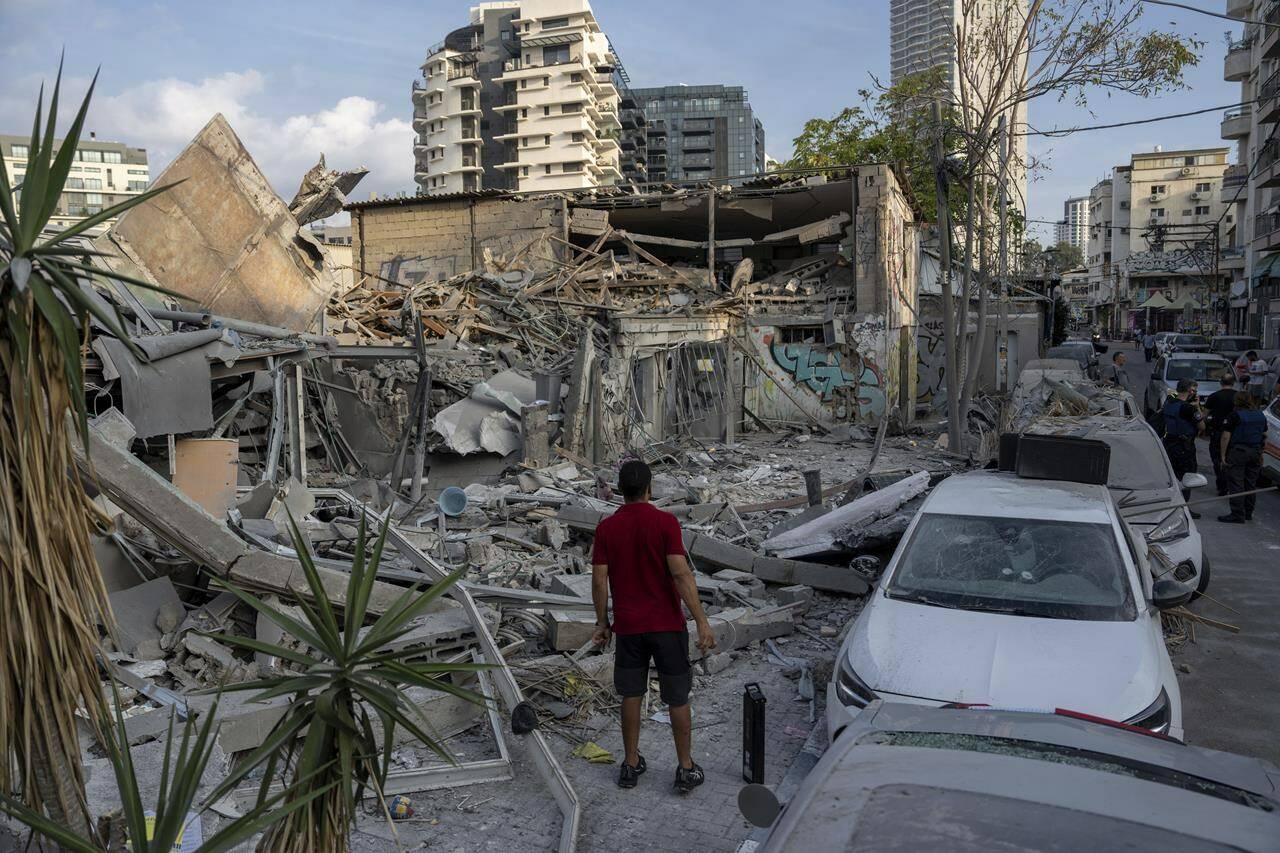Global Affairs Canada has confirmed the death of a fifth Canadian in Israel after a series of attacks by Hamas militants, while Canadians in the besieged Gaza Strip still have no way to get out.
Three other Canadians who were in Israel when the attacks happened Oct. 7 are still missing, officials said Sunday. Global Affairs did not provide details of the fifth person who died or those who are missing, citing privacy reasons.
“We are very focused on addressing the cases of the three missing persons, who we continue to try to locate and bring back to safety in Canada,” Julie Sunday, an assistant deputy minister with Global Affairs Canada, said at a media briefing in Ottawa.
Canada considers Hamas a terrorist group, and Canadian leaders have decried the violence it waged last week near the Palestinian territory of Gaza, which saw hundreds dead and injured. The death and injury toll has since climbed as Israel retaliated.
More than 6,800 Canadians are registered in Israel, and more than 450 in the West Bank and Gaza. Canada is currently assisting about 3,300 permanent residents, Canadians and their families, Sunday said.
The government is still working to get up to 300 Canadians and their relatives out of Gaza, Sunday said, as Israel gears up for an expected ground invasion.
A plan to allow foreign nationals to leave the 365-square-kilometre coastal stretch via the border crossing with Egypt fell through on Saturday.
“Nobody got through that gate yesterday,” Sunday said, calling the arrangements to allow passage through the crossing at the Palestinian city of Rafah “incredibly complex.”
Alexandre Lévêque, another Global Affairs assistant deputy minister, said reaching Rafah could be a challenge in itself.
“Hamas is probably playing some obstruction inside of Gaza,” he said.
“Documentation is going to be really key” in getting Canadians out, said Sunday, who also noted there are challenges in contacting Canadians in Gaza as electricity has been downed.
“We are not telling people to go straight to that border until we have an understanding that there will be an opening.”
Meanwhile, Israel has blockaded fuel, electricity, food and water from entering the territory, impeding transportation and communication.
Another 250 Canadians, permanent residents and their relatives may be able to leave the West Bank territory by bus to Jordan next week, officials said. However, they warned that crossings, as well as Israeli-controlled checkpoints in Jerusalem, are in a state of flux.
“The gate has been opening and closing at different hours, based on what’s going on in the region,” Sunday said, referring to a key Jordanian crossing.
Reem Abukmeil, a PhD candidate at Dalhousie University studying agriculture, left her home in Gaza to study in Halifax in 2020. Abukmeil said she is consumed by fear for her family’s safety as they flee Gaza.
“I’m devastated. I cannot tell you how I feel. I feel my heart is broken to know that I could lose my whole family at any minute,” she said in an interview Sunday afternoon.
Abukmeil keeps in contact with family as much as she can, which is a challenge due to the lack of electricity and internet.
“They are at least alive for now. And that was the last call I got, it was almost an hour-and-a-half ago, and they said this is the worst day since the start,” Abukmeil said.
She has 36 family members from eight households and all of them have now fled toward the south. Many of Abukmeil’s family in Gaza are children, and she said the young ones are suffering most.
“The children, this is so tough for them. They’re traumatized … they are crying and shaking and, of course, no one can sleep,” she said.
“The children see body pieces in front of them, the children are terrified. It’s beyond being catastrophic.
“Everyone just hopes for this to stop right now. Not even (in) five minutes, because each single minute we are losing children, women and innocent people.”
Sunday said Canadians should also avoid travel to Lebanon, where there have been violent clashes along the border with Israel.
Approximately 14,500 Canadian citizens and permanent residents are registered in Lebanon.
Officials say anyone considering travel to the country for non-essential purposes should reconsider, citing security risks.
“This is simply not the time to go there,” said Sunday. “The situation is volatile, and if you don’t need to be there, you should consider leaving while commercial means are still available.”
More than 1,000 Canadians have already left Israel via military planes bound for Athens, officials said. Two planes departed on Sunday, with two more slated for Monday, and more will be available.
Lévêque said in French that Canada’s embassy in Israel and its delegation office in Ramallah remain open.
The Ministry of Foreign Affairs did not immediately provide comment about whether diplomatic staff or their dependants are being asked to leave the region.
READ ALSO: B.C. man among hundreds killed at music festival in Israel

